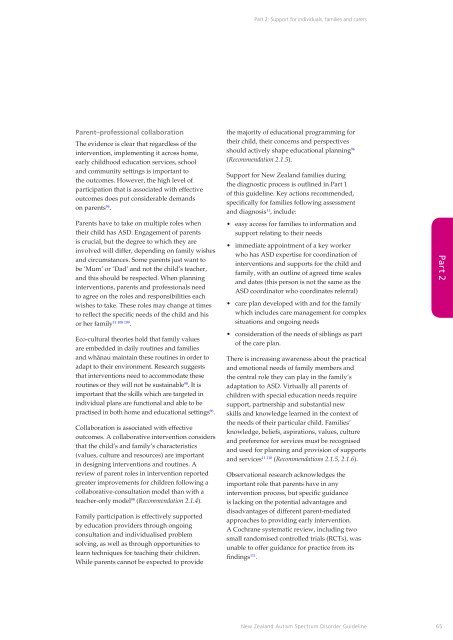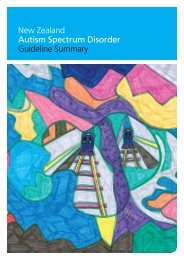New Zealand Autism Spectrum Disorder Guideline - Ministry of Health
New Zealand Autism Spectrum Disorder Guideline - Ministry of Health
New Zealand Autism Spectrum Disorder Guideline - Ministry of Health
Create successful ePaper yourself
Turn your PDF publications into a flip-book with our unique Google optimized e-Paper software.
Part 2: Support for individuals, families and carers<br />
Parent–pr<strong>of</strong>essional collaboration<br />
The evidence is clear that regardless <strong>of</strong> the<br />
intervention, implementing it across home,<br />
early childhood education services, school<br />
and community settings is important to<br />
the outcomes. However, the high level <strong>of</strong><br />
participation that is associated with effective<br />
outcomes does put considerable demands<br />
on parents 96 .<br />
Parents have to take on multiple roles when<br />
their child has ASD. Engagement <strong>of</strong> parents<br />
is crucial, but the degree to which they are<br />
involved will differ, depending on family wishes<br />
and circumstances. Some parents just want to<br />
be ‘Mum’ or ‘Dad’ and not the child’s teacher,<br />
and this should be respected. When planning<br />
interventions, parents and pr<strong>of</strong>essionals need<br />
to agree on the roles and responsibilities each<br />
wishes to take. These roles may change at times<br />
to reflect the specific needs <strong>of</strong> the child and his<br />
or her family 11 108 109 .<br />
Eco-cultural theories hold that family values<br />
are embedded in daily routines and families<br />
and whänau maintain these routines in order to<br />
adapt to their environment. Research suggests<br />
that interventions need to accommodate these<br />
routines or they will not be sustainable 98 . It is<br />
important that the skills which are targeted in<br />
individual plans are functional and able to be<br />
practised in both home and educational settings 96 .<br />
Collaboration is associated with effective<br />
outcomes. A collaborative intervention considers<br />
that the child’s and family’s characteristics<br />
(values, culture and resources) are important<br />
in designing interventions and routines. A<br />
review <strong>of</strong> parent roles in intervention reported<br />
greater improvements for children following a<br />
collaborative-consultation model than with a<br />
teacher-only model 98 (Recommendation 2.1.4).<br />
Family participation is effectively supported<br />
by education providers through ongoing<br />
consultation and individualised problem<br />
solving, as well as through opportunities to<br />
learn techniques for teaching their children.<br />
While parents cannot be expected to provide<br />
the majority <strong>of</strong> educational programming for<br />
their child, their concerns and perspectives<br />
should actively shape educational planning 96<br />
(Recommendation 2.1.5).<br />
Support for <strong>New</strong> <strong>Zealand</strong> families during<br />
the diagnostic process is outlined in Part 1<br />
<strong>of</strong> this guideline. Key actions recommended,<br />
specifically for families following assessment<br />
and diagnosis 11 , include:<br />
• easy access for families to information and<br />
support relating to their needs<br />
• immediate appointment <strong>of</strong> a key worker<br />
who has ASD expertise for coordination <strong>of</strong><br />
interventions and supports for the child and<br />
family, with an outline <strong>of</strong> agreed time scales<br />
and dates (this person is not the same as the<br />
ASD coordinator who coordinates referral)<br />
• care plan developed with and for the family<br />
which includes care management for complex<br />
situations and ongoing needs<br />
• consideration <strong>of</strong> the needs <strong>of</strong> siblings as part<br />
<strong>of</strong> the care plan.<br />
There is increasing awareness about the practical<br />
and emotional needs <strong>of</strong> family members and<br />
the central role they can play in the family’s<br />
adaptation to ASD. Virtually all parents <strong>of</strong><br />
children with special education needs require<br />
support, partnership and substantial new<br />
skills and knowledge learned in the context <strong>of</strong><br />
the needs <strong>of</strong> their particular child. Families’<br />
knowledge, beliefs, aspirations, values, culture<br />
and preference for services must be recognised<br />
and used for planning and provision <strong>of</strong> supports<br />
and services 11 110 (Recommendations 2.1.5, 2.1.6).<br />
Observational research acknowledges the<br />
important role that parents have in any<br />
intervention process, but specific guidance<br />
is lacking on the potential advantages and<br />
disadvantages <strong>of</strong> different parent-mediated<br />
approaches to providing early intervention.<br />
A Cochrane systematic review, including two<br />
small randomised controlled trials (RCTs), was<br />
unable to <strong>of</strong>fer guidance for practice from its<br />
findings 111 .<br />
Part 2<br />
<strong>New</strong> <strong>Zealand</strong> <strong>Autism</strong> <strong>Spectrum</strong> <strong>Disorder</strong> <strong>Guideline</strong> 65











